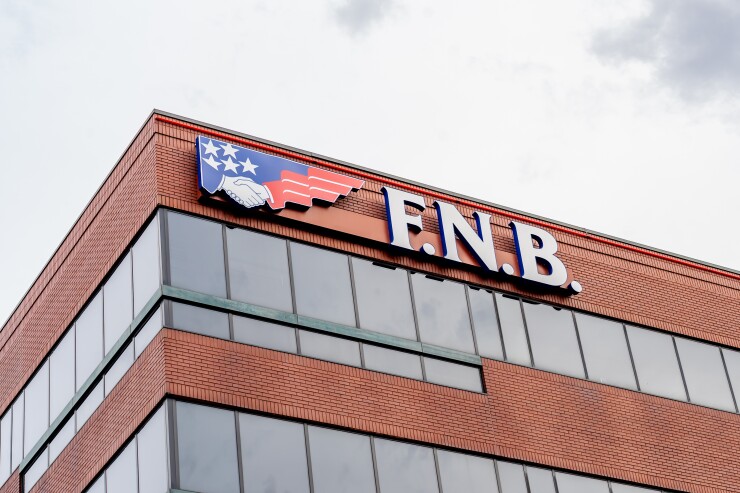The confluence of spiking interest rates, increased regulatory challenges and slowing economic momentum cast a pall over bank merger-and-acquisition activity in 2022. Even executives of acquisitive banks issued cautionary commentary during earnings season, suggesting this year could be even slower.
"I think I wouldn't want to be an investment banker in the short run here," F.N.B. Corp. Chairman and CEO Vincent Delie Jr. said on the Pittsburgh company's earnings call. "I think it's been a pretty challenging environment."
The $43.7 billion-asset F.N.B. closed a
"It becomes very challenging to do a deal that's accretive," Delie said, adding F.N.B. is more likely to spend its excess capital on share repurchases or dividend increases.

John Corbett, CEO of SouthState Corp. in Winter Haven, Florida, said deal activity is bound to ease further this year. The $44 billion-asset company had closed a bank acquisition in
"As we look at it, 2023 M&A is going to be pretty slow for a couple reasons," Corbett said during the bank's earnings call. "Right now, there's just not a lot of clarity as it relates to the regulatory approval process, and there's not a lot of clarity as it relates to potential recession risk."
Recessions often hinder borrowers' ability to repay loans, causing higher credit losses for banks. This includes possible sellers; as a result, many would-be
Additionally, in the wake of elevated regulatory scrutiny
U.S. banks announced 167 acquisitions in 2022, with a combined value of $22.6 billion, according to S&P Global Market Intelligence. Both measures were markedly lower than the previous year, when banks announced 205 deals with a combined value of $76.6 billion.
Robert Bolton, president of bank investor Iron Bay Capital, said that while M&A appetites are clearly satiated early in the new year, banks do have capital to put to work after building buffers at the behest of regulators following the 2008 financial crisis. He expects more banks to return capital to shareholders via dividend hikes and stock buybacks.
"You'll probably see more of that than M&A" in 2023, Bolton said. "Buyers are more cautious right now."
For the first time in years, even serial acquirers are stepping back.
Simmons First National Corp. in Pine Bluff, Arkansas,
"We would always consider a strategic opportunity with regard to M&A, but we are not actively pursuing that at this point in time," Executive Chairman George A. Makris Jr. said on the company's earnings call. "We're at a point in time now where we need to step back, further integrate processes [and] systems and take a look at our people across our entire footprint to make sure that we position ourselves for success over the next three to five years on what we can control, and that is organic growth."
The $12 billion-asset
Seacoast, based in Stuart, Florida, closed
If "deal pricing works, it's in markets we want to be in, we can get comfortable with liquidity and credit, we would look at it. But we just have to be thoughtful about the environment we're in," Shaffer said.
Still, taking a long-term view, Bolton said M&A will resume, given the need for community and regional banks to gain scale needed to invest in technology, compete with national banks and drive earnings in periods of slower organic growth.
South State's Corbett agreed. M&A activity is "likely to pick up towards the end of the year as bank boards begin to meet and think about the future earnings stream. It's likely that earnings are going to flatten off in 2024," following slower loan growth this year amid a weakening economy, "and people will be more enthused about M&A than they are today," he said.





